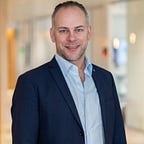Thoughts on the Full Truck Load industry
I had the pleasure of sitting down with Sennder GmbH CEO, David Nothacker the other day for a discussion on where the European Full Truck Load industry will be in 2030 and what technology might do in changing it. David and I have compared notes, thoughts and interacted since their Series-A in 2018 and after raising an amazing Series-C it’s going to be very interesting to see what level Sennder can be taken to and what role they will play in the change?
Picking up on my article on why Maersk Growth invested into fliit from april 2019 David and I are in this post looking into the problem of the lack of truckdrivers in especially Germany and what that will do to the industry and technology.
There is an estimated lack of 50.000 truck drivers in Germany and seasonality within transportation forces logistics costs up as they peak due to higher demands. Within Freight Forwarding we are aware of this and as the average age of a truck driver is increasing there is a demand for new technologies to help solve this bottleneck.
Below I’ve referred parts of our discussion:
David “Technology will most likely solve this problem. The increasing investments into autonomous trucking will create an infrastructure where autonomous trucks will be taking cargo from highway truckstop to highway truckstop. At this point a physical truckdriver will take over the truck and drive it to the designated drop-off point, being a warehouse or final destination.”
Jeppe “What do you believe this will do to the industry as we know it today?”
David “Today the carrier market consists of a longtail (3–20 trucks) that covers 80% of the trucks available. The carriers operate the trucks, hire drivers and find loads to move. As I said before we will see the arrival of the autonomous trucks which will change this longtail to be owned by a new type of carrier. This might be the truck producer, the 3PLs or a technology company but for sure we will see this type of companies change the industry as we know it today.”
Jeppe “Sennder is currently focused on the European FTL space and you have a great understanding of it. Are your thoughts on the US market the same?”
David “I don’t belive that the European market can be compared to the US that easily. The US market has a different composition of carriers which creates a different business model. The US also seems to cover longer distances which makes it ready for platooning technologies. I believe that technologies will be adapted differently dependent on geography, regulation and legislation”
Jeppe “I very much agree. As upply chains changes over geographies we will see different and probably multiple winners on the technology piece. I’m a true believer that we will not see a winner takes it all industry just as it is today. I’m very excited about all the different possibilities that are appearing in the industry right now. Also it will be interesting to see what business-models will be the most successful within transport and logistics”.
As more and more investors focuses on supply chains that has not been digitized there will be a continuous flow of liquidity into the ecosystem. The industry will see significant technological developments in the years to come and it will happen all over the world. Here at Maersk Growth we are looking at the full supply chain and believe that we will need to invest in the great opportunities no matter where they appear and no matter the stage of the company.
Maersk Growth is the corporate venture arm of A.P. Moller — Maersk. We accelerate and invest in startups and new technologies to build the future of trade. We are solving problems for our customers and for ourselves, by combining entrepreneurship with the power of Maersk.
